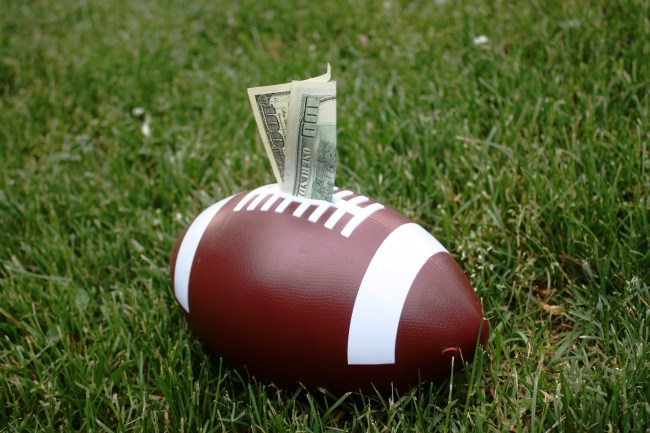
Shutterstock
The fantasy football regular season ended about a month ago. While millions of players ended up losing their shirts or suffered a fate far worse, thousands of players collected a ton of money from friends, family and the guy in Human Resources everyone despises.
If you’re one of the lucky winners this season, you’re probably toying with the idea of letting it ride and gambling on the playoffs or Super Bowl. Have you considered taking the cash and putting it to work for you?
Garrett Oakley is CFP, CPA and financial planning professional with Betterment – the robo-advisor service that aims to provide optimized investment returns for individual, IRA, 401k, and rollover accounts. We asked his advice on strategies on how to best invest fantasy football winnings to either pay off debt or save for retirement.
The first question that everyone is going to ask, “do I really have to tell the government about my fantasy football winnings?”
In reality, all fantasy winnings should be reported as income on your tax return. There is no definitive IRS ruling on how to treat the earnings on your tax return, but in short, it depends on if participating in fantasy football is considered gambling.
Most argue that this is not the case as the prize winnings are predetermined, and it takes mental or physical skill to win, not just luck, but I’m sure the last place finisher would disagree. If we aren’t considering it gambling, then the next step would be figuring out if the activity is considered a business or hobby. Typically it would be viewed as a hobby and therefore, follow the hobby loss rules.
One good thing is that you can use the net-method, which means you can net your entrance fee from the winning contest against the winnings from that contest.
What about the fantasy football players who lost their shirts this year? Can people report fantasy football losses for a tax deduction? How?
If we are considering this a hobby, you are limited to taking a deduction for losses and expenses only up to the point of income from the activity. What this really means is that you can’t deduct more in expenses than your reported as income from the activity.
To make it a little more complicated, the deduction(s) would be an itemized deduction on Schedule A and subject to a 2% AGI floor. So if you take the standard deduction, you would not see any deduction on your tax return.
If you’re one of the champions that made a charitable donation in Todd Gurley’s honor, you might be able to take additional tax deductions. If you are the one making the donation directly to the qualifying charity in another person’s honor, you can take this deduction as an itemized deduction on Schedule A. You would still need to report the winnings as income and then if you Itemize you could deduct the donation.
Just like taking a tax deduction for losses and expenses, if you don’t itemize, you won’t see any tax benefit from the donation.
What’s the best way to invest earnings over $500?
If you qualify, a Roth IRA is a great place to put the winnings. You are limited to $5,500 ($6,500 if over the age of 50) but the funds grow tax-free. Depending on the amount of winnings, you could always use the money to subsidize your expenses and increase your salary deferral into your employer-sponsored plan like a 401k.
Any other financial implications for your winnings? Tips?
If you are unsure on how to report the winnings I’d reach out to an accountant to assist in filing correctly. Remember, paying taxes on the winnings is still better than taking the SAT or whatever shaming tactic the loser of the league has to complete.
NEXT: More Millennials Are Turning To Robo-Advisors To Manage Their Money But Is It Right For Everyone?